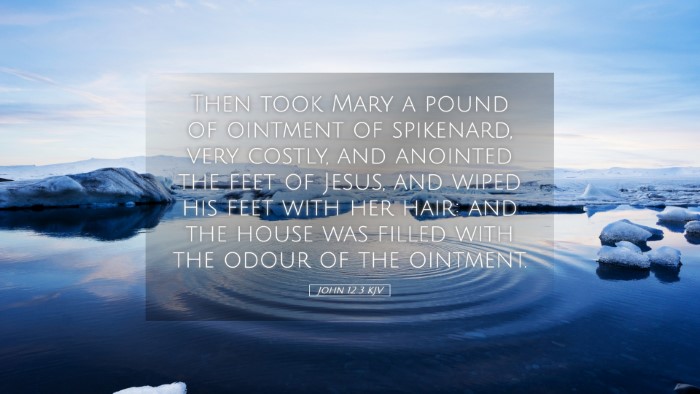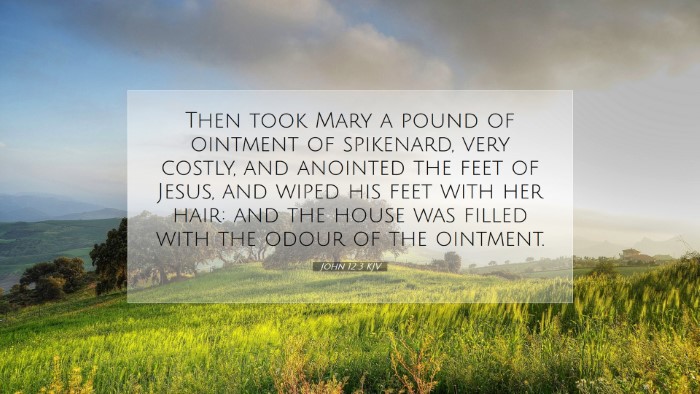Commentary on John 12:3
John 12:3 presents a deeply profound moment in the narrative of Jesus’ ministry. The verse states:
“Then took Mary a pound of ointment of spikenard, very costly, and anointed the feet of Jesus, and wiped his feet with her hair: and the house was filled with the odour of the ointment.”
This act not only signifies Mary’s deep devotion but also foreshadows Jesus’ impending sacrifice. Below, we will explore insights gleaned from various public domain commentaries, focusing on the intricate layers of meaning found in this single verse.
Significance of Mary’s Action
Matthew Henry draws attention to the lavish nature of Mary’s offering. The spikenard mentioned is an expensive ointment often used in burial rituals, which indicates Mary’s understanding of the significance of Jesus’ identity and mission. By using this perfume, she is not only honoring Him but also anticipating His death and burial.
Henry elaborates that Mary’s actions are a supreme example of loving devotion. In an era where women’s voices were often muted, Mary’s bold public display of affection toward Jesus signifies a breaking of social norms in favor of heartfelt worship. This ties into a larger biblical theme where extravagant acts of devotion are highlighted (e.g., the widow’s offering in Mark 12:41-44).
The Costliness of the Ointment
Albert Barnes emphasizes the financial cost associated with the spikenard. It is described as “very costly,” which implies that it was not just a mere gift, but a sacrificial offering on Mary’s part. The weight of this sacrifice speaks volumes about her love and dedication to Christ.
Barnes indicates that the offering of the spikenard also reflects our call as believers to give generously to Christ, acknowledging that true devotion may come at a significant personal cost. The act serves as a critique of those who would begrudge giving to the Lord when the act is a genuine expression of love.
Wiping His Feet with Her Hair
Adam Clarke provides an analysis on the act of wiping Jesus’ feet with her hair, highlighting its cultural implications as well. In the Jewish tradition, hair is considered a woman’s glory (1 Corinthians 11:15), and using it in this manner portrays an ultimate act of submission and humility. Clarke suggests that she disregards societal norms to express her devotion towards Jesus, acknowledging Him as the highest authority in her life.
This action also signifies an intimate relationship with Jesus. Mary’s anointing contrasts with the ceremonial and perfunctory nature of the religious practices of the day, showing that spiritual connection is not found in rituals, but in personal devotion and surrender.
Symbolism of the Fragrance
In examining the phrase “the house was filled with the odour of the ointment,” we see the multifaceted meaning of fragrance in biblical texts. Both Henry and Barnes comment on how the scent symbolizes the presence of Christ. When we worshipfully dedicate our resources and lives to Him, it has a transformative effect on our surroundings and community.
This raises questions for pastors and theologians: How does our devotion to Christ fill our homes, churches, and communities with the sweet aroma of His love? Are we willing to create atmospheres conducive to the presence of God through our acts of sacrifice and worship?
Foreshadowing Christ’s Death
As the narrative progresses, we can interpret Mary’s action as a foreshadowing of the anointing that would take place following Jesus’ crucifixion. Commentators like Clarke note that Mary may have had an awareness of the impending events of Jesus’ death, leading her to act in such a prophetic manner. The connection between Mary’s anointing and Jesus’ burial is further confirmed in Matthew 26:12, where Jesus acknowledges the significance of her act.
This foreshadowing embodies the theme of preparation for the coming sacrifice, prompting scholars to consider the importance of vigilance in being spiritually prepared for how God is moving in our lives. Mary’s recognition of the costliness of her worship serves as a reminder to believers to prepare their hearts for sacrificial love towards Christ.
Responses to Worship
The diverse reactions to Mary’s offering also warrant exploration. While Mary expresses profound love, Judas Iscariot’s complaint about the wastefulness of the ointment reveals a critical, self-serving attitude towards sacrificial giving. Matthew Henry argues that this sort of response is common to those who do not truly understand the nature of Christ’s mission and the depth of His worthiness.
This contrast serves as a lesson for contemporary readers. It is necessary for church leaders, students of theology, and believers alike to guard their hearts against criticism of the lavishness in worship, recognizing that what appears as excess to the world can be a genuine expression of devotion to Christ.
Conclusion
John 12:3 serves as a powerful testament to the themes of devotion, sacrifice, intimacy with Christ, and the fragrance of worship. By examining Mary’s actions through the lens of various commentators, we glean rich insights into what it means to truly honor Christ with our lives and offerings.
As we engage with this scripture, may our hearts be stirred to offer our best to the Lord, recognizing His worthiness in all aspects of our lives. Just as Mary acted boldly out of love, so too are we called to return to Jesus what He has graciously given to us, transforming our surroundings with the aroma of His sweet presence.


